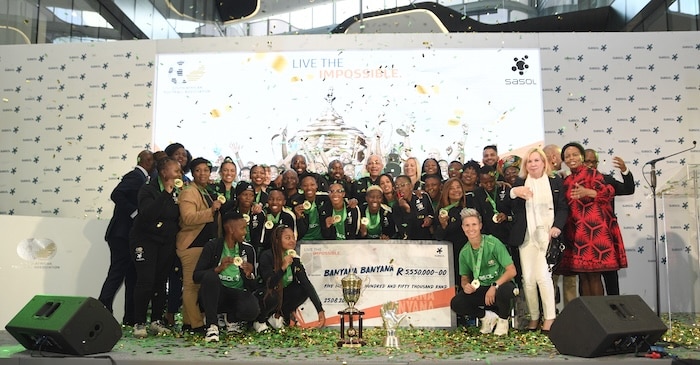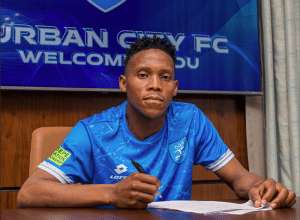Banyana Banyana return to the scene of their greatest triumph and look to retain the continental crown, writes Mark Gleeson.
It took years of struggle, scrapes and heartache, and a few bruises along the way, before Banyana Banyana finally got to stand on top of the Women’s Africa Cup of Nations podium.
But three years ago, at Rabat’s Moulay Abdellah Stadium, South Africa were finally crowned continental champions, winning the greatest prize in continental women’s football for the first time.
They had been competing in the tournament, originally the Africa Women’s Championship, from 1995 but never got to lift the trophy, despite being oh-so close.
They were runnersup four times, bronze medal winners twice and finished fourth on three separate occasions.
But in Morocco it all finally fell into place and a 2–1 win over the hosts in the final in front of a packed house ensured a long awaited consecration for South African women’s football.
Now Banyana Banyana head back to the north African country to defend their title, hoping to retain the trophy and begin a new cycle ahead of next Women’s World Cup in Brazil in two years’ time.
South Africa have Ghana, Mali and Tanzania as opponents in their opening round group having qualified after just a single two-legged tie in the preliminaries when they got the better of Burkina Faso 3–1 on aggregate.
The traditional pecking order in African women’s football has swung heavily to-and-fro over the last decade as many new contenders have emerged.
World football’s governing body FIFA have mandated that as much as 20% of the development money that they give to African football associations be used on women’s football, which has helped a rapid rise in fortunes for many countries who not long ago did not even have a women’s team.
But all the sides at the finals this month have been at the Women’s Cup of Nations before, which will ensure a high level of competitiveness.
Morocco will be smarting after losing the last final, and their investment in women’s and junior football and futsal has reaped rich dividends of late with Moroccan teams at all levels consistently emerging as African champions.
There is a giant academy outside the city of Sale where the Moroccan national teams cloister in state-of-the-art facilities and are able to prepare in the best possible conditions.
“Here, I really do feel like a professional football player,” Morocco defender Yasmin Mrabet says.
There is also fulsome support from the fans when a decade or so ago, women playing football were frowned upon by many sectors of a largely conservative society.
Coach Jorge Vilda, who replaced the popular Reynald Pedros in October 2023, adds ominously: “In the last year and a half, we’ve made big progress. We have a strong defence and we’ve also improved our attack and varied our style. The tournament is getting closer, and this gives us more motivation to perform well.”
Vilda was coach when Spain won the last World Cup but left soon after in the wake of the scandal around their federation president Luis Rubiales and his kissing of Jennifer Hermoso on the lips during the medal presentation.
Vilda might be turning the hyperbole up a little when he claims the Morocco side is the “best I have coached so far”.
Nigeria have long been a traditional force in the women’s game on the continent and are never to be written off, although they won the last of their nine titles in 2018.
Players like Rasheedat Ajibade, Rinsola Babajide, Gift Monday, Ifeoma Onumonu and Asisat Oshoala, who is a six time winner of the African Women’ Footballer of the Year trophy, are all potential match winners.
Thembi Kgatlana (above) is the only South African to win the award, back in 2018, and moved from the North American Women’ Soccer League to Tigres in Mexico for a R5 million fee two years ago.
She is over her injury woes and scoring again and will be key to coach Dr Desiree Ellis’ (right) plans.
“I know that it’s going to be challenging,” Kgatlana says of the defence of Banyana’s crown, adding she and her teammates are up for it.
“Who doesn’t want to show up? I love big games because they motivate me, it allows me to express myself,” she told ESPN. Ellis does not think South Africa are being given enough respect.
“Even though we are the defending champions, we are not classed as one of the favourites. People talk about Zambia, Nigeria and Morocco to say who is likely to win it. They don’t talk about SA and we try to keep that inside of what we want to do,” she said.
“We’ve never been big talkers on anything like that. We know how big the task is. We know as the defending champions, whoever plays against us it is their final. So, we had to be prepared, once we knew who we were playing against we started looking at getting footage and trying to analyse and share that with other coaches,” Ellis added.





